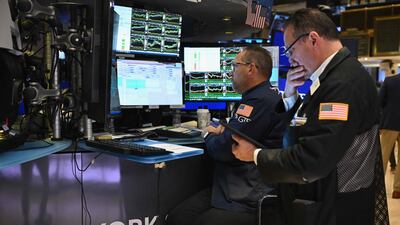Wall Street's main indexes closed lower on Friday, with the S&P 500 and Nasdaq notching their biggest one-day losses in two weeks, as Trump trades lost steam and investors bet the US Federal Reserve will have to slow the pace of policy easing.
Federal Reserve chairman Jerome Powell on Thursday cited continuing economic growth, a solid job market, and inflation above the US central bank's 2 per cent target as reasons the central bank can afford to be careful with the pace and scope of future rate cuts.
“The post-election rally paused for breath, with the latest Fed comments on the economy stopping the surge in its tracks,” said Richard Hunter, head of markets at Interactive Investor.
“Chairman Powell popped some of the party balloons, stating that the Federal Reserve did not need to be in a hurry to cut interest rates. Quite apart from an economy which continues to grow despite the backdrop of higher interest rates, the Fed will be acutely aware that some of the new president’s policies, such as tax cuts and tariffs, will likely be inflationary. As such, the central bank is perhaps signalling that it would rather keep its powder dry until those inflationary impacts are better known.”
As the initial euphoria about president-elect Donald Trump’s pro-business agenda begins to fade, investors are coming to terms with the costs of his fiscal plans and their potential to reignite inflation.
Traders increased bets the Fed will not change rates at its December meeting, pricing in a roughly 42 per cent chance, versus roughly 14 per cent a month ago, according to the CME FedWatch tool. They also dialled back expectations for easing in 2025.
This view was reinforced by Friday's economic data showing US retail sales rose slightly more than expected in October. Import prices also rebounded and data released on Wednesday and Thursday showed sticky inflation.
“All in all, the Fed is coming to the realisation that cutting rates hurriedly was not a brilliant idea, and the first thing to do now is to do nothing in December,” said Ipek Ozkardeskaya, senior analyst at Swissquote.
Mr Hunter said the market consensus for a cut in December remains at over 60 per cent, although the figure dropped from a previous 82 per cent before Mr Powell’s comments.
“The move follows a further reading on wholesale inflation in the form of the Producer Price Index, which rose by 2.4 per cent from the year before, a slight acceleration from the previous month’s 1.9 per cent reading. Core PPI was slightly higher than expected and followed a Consumer Price Index number the previous day which suggested that while the direction of travel was intact, the fight against inflation is not quite won,” he added.
Friday’s sell-off ended a week in which market focus shifted from the US election win by Mr Trump, seen as a pro-business choice, to worries about the rate cut path and potential inflation risks under the next administration.
For the week, the S&P 500 fell 2.08 per cent, with tech stocks leading declines. The Nasdaq declined 3.15 per cent, marking their biggest weekly losses in more than two months. The Dow fell 1.24 per cent for the week.
The Dow Jones Industrial Average fell 0.70 per cent, the S&P 500 lost 1.32 per cent and the Nasdaq Composite dropped 2.24 per cent. The small-cap Russell 2000 index ended down 1.4 per cent, its fourth consecutive session of losses.
CBOE’s volatility index, also known as Wall Street's fear gauge, hit 17.55 earlier on Friday, the highest since election day on November 5. However, the index pared gains to close at 16.14.
On Friday, shares of all “Magnificent Seven” megacaps retreated except Elon Musk’s Tesla, with Amazon, Nvidia and Meta Platforms sliding more than 3 per cent.
Tesla fell nearly 6 per cent on news that Mr Trump would eliminate the $7,500 consumer tax credit for electric vehicles.
Meanwhile, drug makers Moderna and Pfizer came under pressure after Mr Trump named prominent vaccine sceptic Robert F Kennedy Jr as his health secretary.
“With the quarterly reporting season all but wound down, two names next week could add to potential volatility. Walmart will release its numbers, giving a further indication of the state of the consumer, while market darling Nvidia will need to match the increasingly lofty expectations which it now carries, with the stock up by 205 per cent this year alone,” according to Mr Hunter.
“In the meantime, the Dow Jones is now ahead by 16 per cent so far this year, the S&P 500 by 24.7 per cent and the Nasdaq by 27.3 per cent.”
Ms Ozkardeskaya said the US dollar extended gains to the highest levels in more than a year, supported by the hawkish shift in Fed expectations.
“The price action makes sense, but the fact that the US dollar has now stepped into the overbought territory will likely slow the short-term demand for the greenback and could lead to a minor correction. But the price pullbacks should continue to be interesting dip-buying opportunities for the dollar bulls looking for a further extension of gains against majors.”


